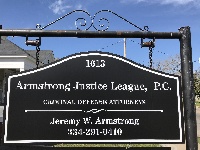Phenix City RICO Act Lawyer, Alabama
Sponsored Law Firm
-
 x
x

Click For More Info:
-
The Law Offices of Richard L. Cooper, P.A.
848 Brickell Avenue Suite 800 Miami, FL 33131» view mapDWI/DUI, Drug Trafficking, Felony Nationally Ranked Top 40 Under 40
With Richard L. Cooper you can expect a trusted confidant who will work diligently to fully understand your case and determine a road map to help you regain control of your life.
800-756-2781
Not enough matches for Phenix City RICO Act lawyer.
Below are all Phenix City Criminal lawyers.
Jeremy W. Armstrong
✓ VERIFIEDCriminal, Felony, Misdemeanor, DUI-DWI, State Appellate Practice
"A Criminal & D.U.I. Defense Law Firm"
I have spent my entire legal career in the criminal justice system as a former prosecutor and a criminal defense attorney since October 2000. In Apri... (more)
Connie Jo Cooper
Wills & Probate, Divorce & Family Law, Criminal, Medical Malpractice
Status: In Good Standing Licensed: 32 Years
FREE CONSULTATION
CONTACTCharles Eddie Floyd
Social Security, Workers' Compensation, Criminal, Slip & Fall Accident, Accident & Injury
Status: In Good Standing Licensed: 53 Years
Jo Anna Chancellor Parker
Divorce & Family Law, Criminal, Wrongful Death, Personal Injury
Status: In Good Standing Licensed: 22 Years
James Edward Hall
Social Security -- Disability, Criminal, Wrongful Death, Personal Injury
Status: In Good Standing
Ralph Michael Raiford
Accident & Injury, Criminal, Estate, Traffic
Status: In Good Standing Licensed: 46 Years

 Richard L. Cooper Miami, FL
Richard L. Cooper Miami, FL AboutMiami Attorney at Law
AboutMiami Attorney at Law ServicesCriminal Defense
ServicesCriminal Defense

